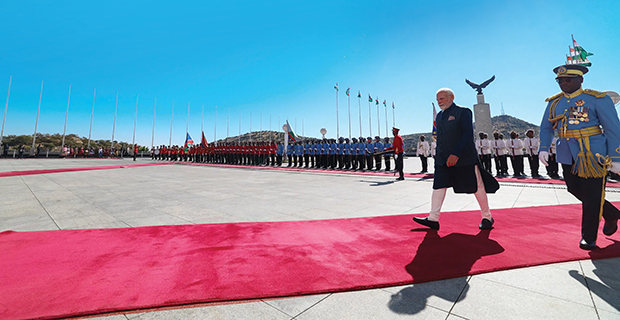Parliamentary Diplomacy Peaks
Prime Minister Modi’s historic State Visit to Namibia strengthens diplomatic, trade and technological ties across Africa.
Windhoek: Prime Minister Narendra Modi’s one-day State Visit to Namibia on July 9—the first by an Indian Prime Minister in 27 years—drew a standing ovation in the Namibian Parliament and marked a diplomatic high point with multiple agreements and deepened strategic alignment.
As PM Modi rose to address a Joint Session of the Namibian Parliament, chants of “Modi, Modi” echoed across the chamber, symbolising the warmth of the bilateral relationship and underscoring the global resonance of India’s soft power. This marked his third Parliament address in a week—following Ghana and Trinidad & Tobago—cementing his position as the Indian Prime Minister who has addressed the highest number of foreign parliaments (16 in total), far ahead of his predecessors.
During delegation-level talks, Namibia’s President Netumbo Nandi-Ndaitwah described the visit as “historic”, being the first State Visit hosted under her presidency since taking office in March this year. Both leaders praised the shared democratic values, historical camaraderie, and expanding economic partnership between the two nations.
Two significant MoUs were exchanged—on setting up an Entrepreneurship Development Centre and on cooperation in health and medicine. PM Modi also announced India’s support for Quick Impact Projects in agriculture, cyber security, women empowerment, and child welfare. A highlight was Namibia’s entry into the UPI ecosystem—becoming the first country to sign a licensing agreement with NPCI for adopting India’s digital payment system.
Namibia also joined two major Indian-led global initiatives: the Coalition for Disaster Resilient Infrastructure (CDRI) and the Global Biofuels Alliance. India extended an invitation to Namibia to join the International Big Cat Alliance, acknowledging its key role in the successful translocation of Cheetahs to India.
Namibian President Nandi-Ndaitwah welcomed India’s ‘pharmacy of the world’ proposal to set up a pharmaceutical manufacturing facility in Windhoek, which she said would enhance regional health security. She also supported India’s pitch for reforming the UN Security Council, advocating fairer global representation.
Other key sectors identified for cooperation include green hydrogen, clean energy, critical minerals, value-added mining, tourism, maritime security, defence, and agriculture. PM Modi shared India’s experience using drones in farming—an initiative that could benefit Namibia’s agri-sector.











Comments.